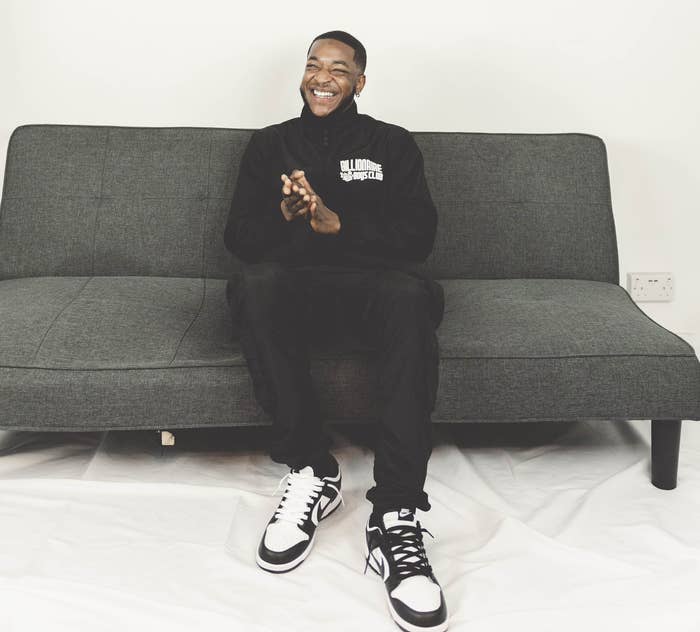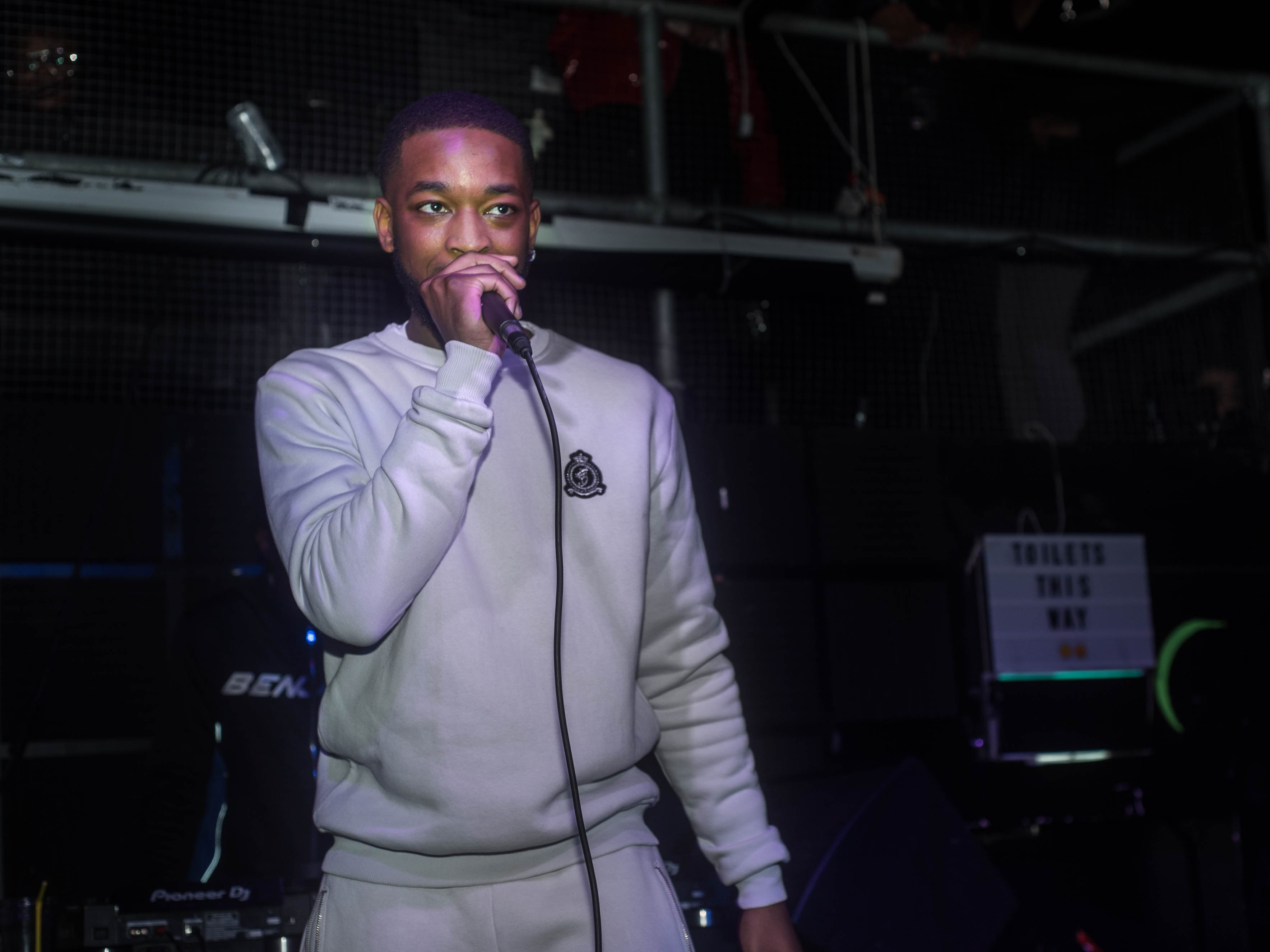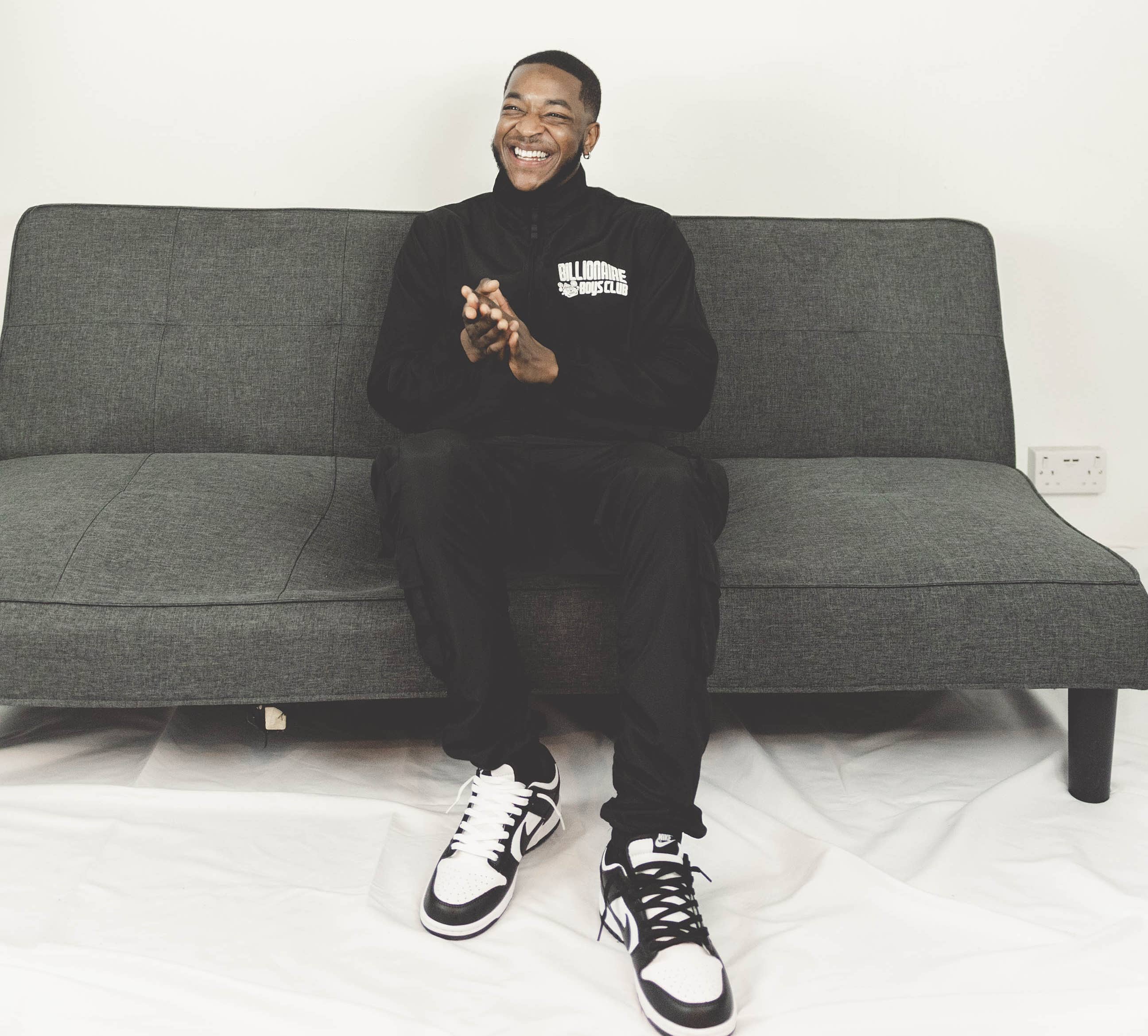
Flashy Sillah has his finger firmly on the pulse of UK rap and the culture that encompasses the new gen of Black British music lovers—and you might be hard-pressed to find someone with as much excitement to be in this space than him right now.
The 24-year-old’s interview series, The Block Report—hosted exclusively on Mixtape Madness’ YouTube channel—is a bi-product of the Covid-19 pandemic: it began in 2020 as a way for him to document current events in UK music culture while seated in front of his estate in Tottenham, North London. Inspired by the diverse cultural heritage that enriched his local area—as well as talents such as content king Poet and grime legends Jme and Skepta—Sillah is following in the footsteps of UK greats in his own way.
Four seasons in and counting, the music connoisseur has already called on the likes of Youngs Teflon, Kojey Radical and M1OnTheBeat to the Block Report bench, where in-depth conversations are had about music, football, fashion and everything in between. The show has now taken on a new form as an IRL experience, bringing together intimate-sized crowds for open-mic nights in a bid to give undiscovered artists a chance to compete for that winning spot. Not only does each participant get to showcase their talent in front of tastemakers and potential new fans, but the winner also earns a free music video that’s uploaded onto Mixtape Madness.
Sillah’s excitable, almost child-like penchant for talent discovery has given him the ability to recognise artistic potential and star power before the masses. And it is that very instinct that led him to select 15-year-old rapper Shakes to perform at his most recent event, who went on to win the showcase. Months later, the young artist signed with Sony imprint Dream Life Records and has become a viral sensation with his Cord Socials A-Z freestyle and his appearance on Spit Game.
We sat down with Flashy Sillah at No Stars—a recording studio in North London—to uncover the origin story of The Block Report, his long-term vision for the project, the importance of content creators having their own platforms, and more.
“Having your own thing, like how we all tell artists: ownership is key! Whether it’s a small, medium or large-scale platform, owning what’s yours is super important.”
View this video on YouTube
COMPLEX: You were born and bred in Tottenham—an area of North London that has given us a multitude of talents. How much of a role has your ends played in your journey into music?
Flashy Sillah: I’ve borrowed so much from people that have come out of my ends, like Skepta, Jme, Frisco, Headie One, and even just going to school with M1OnTheBeat—being surrounded by so much inspiration played a big part and it made me more open-minded. Poet, who is a GOAT in the content creation space, is also from Tottenham; he was the one who made me think, “Rah! I could do the exact same thing. I can be a content creator, too.” All of these guys’ work has helped break down barriers and opened the door for me to do what I’m doing now.
You initially started The Block Report as an interviewing series on YouTube in 2020, but in just two years, it’s grown to become a lot bigger than that. How did the idea for the show first come to you?
Initially, I had a show on the Cold Drinks Podcast’s YouTube channel called Sillah’s Sound Lab. That lasted for about three episodes, and then Covid hit. I told my camera guy, “Listen, the studio’s not up for hire right now because everyone’s shut down, but just come to my block, bring your tripod and we’ll shoot on the bench. I’ll just report on what’s going on in the music scene and my favourite songs of the week.” I like the backdrop of my estate, how gritty it looks, and I knew that my director’s camera could bring out the grittiness in that because it’s so clear. And then, it just went off! I came up with the name because it’s obviously set in front of my block, but it’s also based on one of my favourite albums: The War Report, by Capone-N-Noreaga.
How would you say The Block Report show is different from other UK music-based shows out there?
I would describe it as a place where people who come from an estate can hear the opinions of someone like myself, who talks just like them or comes from a similar place to where they’re from. It’s for them to gain information from the scene in a way that’s relatable. We see a lot of news outlets—or, let’s say, interview platforms—that are in studios, but it’s not really relatable to the consumer. The aim of The Block Report is to create relatability. I want it to be a thing where people who come from estates can see that you don’t have to be a drug dealer, a footballer or a rapper to succeed—you can be a media guy, too, and still be cool.
Talking about music on-camera and being able to come across in a relatable and interesting way is very difficult to achieve. Not everyone can pull it off. How are you able to do it so effortlessly?
First and foremost: I’ve got genuine love for UK music culture. Being entertaining on camera, that’s just me being a people’s person and being able to adapt to any crowd. One day I could be chilling with the mandem, and the next I could be with all the troublemakers [laughs]. Some days you could find me chilling with the emo kids; other days you could find me with the cool white kids or whatever. I think having that adaptability is important. I can speak to pretty much anyone and it’ll be a dope conversation, so I just adapt that to what I’m doing when I’m interviewing artists.
Taking The Block Report from existing solely online to a real-life event must have been challenging, but the ones you’ve had so far have been really successful. Were open-mic events part of the vision early on, or was it something you thought of later?
It wasn’t part of the vision at all. When I started The Block Report, it was just meant to be a YouTube show, but then I went to watch my older brother perform at an open-mic night. There were only about 30 people there but it was so lit! The presenter who was there was so cold and my brother was turning up the stage. The fact that there were only 30 people in the audience meant that it was so intimate, and it opened my eyes to so many things I wanted to work on. After that, I said to myself that I was going to do an open-mic night for Block Report. At the time, we hadn’t had live music for two years because of Covid-19, and people hadn’t discovered artists in a real fashion for a long time. Once I did it, I couldn’t believe it. Honestly, the turnout for the show—I’m still shocked! [Laughs] The second show, though, that was a lot more pressure.
Why was there more pressure the second time round?
It was a competitive week, due to it being Jubilee weekend, and I ended up having to delay it. This is the first time I’m saying this but I actually delayed it because the ticket sales were low. The tickets weren’t selling because everyone was going out to day parties. No one’s going to want to be in a dark room listening to live music, so I pushed it back until two weeks later. It’s all about being strategic. It wasn’t easy at all, but I loved the outcome. My thing is about changing lives in the music industry, and that’s what I want to keep doing.
“With open-mic events, or just live music events in general, you get to feel an artist’s energy and stage presence… In my opinion, streaming and online stuff is about 25% of how you should judge an artist.”

I think it’s interesting that you chose to focus on the live music space as a way to platform new talent, especially during a time when many artist discovery platforms choose to push artists using social media as their primary medium. In your opinion, what’s the value in discovering a new artist through open-mic events compared to being introduced to their music through streaming platforms or on social media?
With open-mic events, or just live music events in general, you get to feel the artist’s energy and stage presence. You get to see how they interact with the crowd, their intimacy, and if they can actually rap because it’s live! In my opinion, streaming and online stuff is about 25% of how you should judge an artist. Like we say with singers, you only truly know a singer until they perform live. Similarly, with rappers, you can only truly know them based on how they deliver their bars live. So I want to expose that. I always make sure the artists that I select for my showcase are under pressure to perform to their best ability, because it’s all about bringing up the quality of UK music and I think that’s the aspect people miss. With streaming, you can always do 10,000 takes, but with live music, you can’t retake that performance.
The winner of the most recent Block Report open-mic, 15-year-old rapper Shakes, made quite an impression on the audience, receiving reloads aplenty and co-signs from the likes of Youngs Teflon and Tiny Boost. How did you come across him?
A week before the live shows, I opened up submissions where people had to send in their best song, and he was picked as one of the final five. I liked him because he has such a mature flow at his young age. Rappers his age, they might miss a bar or skip a beat, but not this kid. He was ready.
What’s your thoughts on his success since The Block Report: Live?
I’m so happy for the kid! He’s got such a high ceiling for potential due to him being so young, but at the same time, I don’t want people to focus on his age too much because I don’t want that to become his whole brand. He recently got signed to Sony’s Dream Life Records and that’s gonna open up so much more resources for him. Before I actually found him, he didn’t have one track on streaming platforms or a music video out, but since the live show, things have just been flying. He’s been going viral on TikTok and has a video on Mixtape Madness.
View this video on YouTube
Out of the many submissions you get for each live show, what qualities do you look for to assure you that they’re the right pick?
I’ll always consider whether an artist will appeal to my target audience, who are usually young rap-lovers from the UK, and that are either Black or from another ethnic minority. Obviously, with rap, I’ve got a strict criteria: your delivery, your cadence and your flow has got to be hard. When selecting all of the submissions, I make sure that there’s all different types of spitters—a grime MC or someone with grime roots, a drill rapper, a melodic rapper and a road rapper. The aim is to appeal to all types of audiences.
Outside of The Block Report, you do a bit of A&R work. Do you do that independently or do you work for a label?
Right now, it’s independent. I think that’s because, during my early years in the industry, when I was 15/16, I was around so many important people that have engineered for D-Block Europe, Chip, and many others in my local area. Through those connections, I was involved in the A&R’ing process by default and I’ve made decent money through it.
Where did your desire to be involved in music, particularly behind the scenes, derive from?
My sister’s a singer—she’s quite well known on the live music scene—and I started following her to the studio when I was, like, 14 years old. Seeing her process, I’ve always known how music is meant to be structured from early. Then I officially came into this game as part of a creative collective called Flash Squard. We started off as rappers in Tottenham, and I was managing Millz and Ray Niro in the group. With me not being the primary artist in our group, I was always the one involved in everything else: the production, the vocals, the rearrangements of songs. So A&R’ing and artist development, I’ve been doing it.
How do you see The Block Report being scaled up? I can see there being a Block Report Festival one day.
[Laughs] Yeah, a festival is definitely in the long-term plans! But one thing I’m definitely gonna do is a project with all the rappers I grew up on—including the winners of the open-mic events—all shared on one project, whether it’s an EP or a mixtape. That’s even following in the fashion of Kenny Allstar, who hosted classic mixtapes like Potter Payper’s Training Day trilogy. I won’t be hosting the mixtape but I’ll be executive producing it, A&R’ing it and putting together all the songs—kinda like what DJ Khaled would do.
Lastly, how important would you say it is for content creators to create platforms that they own?
It’s important because, that way, you don’t have to rely on other platforms and you’re able to distribute your own creativity. Having your own thing, like how we all tell artists: ownership is key! Whether it’s a small, medium or large-scale platform, owning what’s yours is super important.



